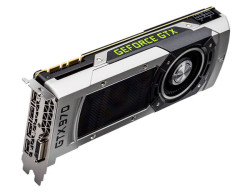Top Class Actions’s website and social media posts use affiliate links. If you make a purchase using such links, we may receive a commission, but it will not result in any additional charges to you. Please review our Affiliate Link Disclosure for more information.

Plaintiff Mark Roushion, who lives in California, filed the graphics card class action lawsuit against NVIDIA Corporation and EVGA Corporation on March 9 in a California federal court. NVIDIA is the developer and EVGA is the manufacturer of the graphics card.
“Within the industry, it is customary for designers like NVIDIA to license their designs to major electronics manufacturers like EVGA, who in turn press, package, and sell NVIDIA’s graphics cards,” the class action lawsuit explains.
“However, each graphics card licensed to outside manufacturers must meet NVIDIA’s specifications,” it continues.
Therefore, NVIDIA’s graphics cards are made by a variety of makers including Gigabyte, which was hit with a similar class action lawsuit in February.
Roushion claims in his NVIDIA graphics card class action lawsuit that he purchased “two EVGA-made GTX 970 graphics cards for $349.99 each on the Newegg.com website.” The graphics cards were labeled “EVGA 04G-P4-0974-KR GeForce GX 970.”
The California man chose the GTX 970 “because he had a prior version of a NVIDIA discrete graphics card and wanted to purchase a version which he believed had more [gigabytes] and thus more value for his money,” the NVIDIA graphic card class action lawsuit explains.
The specifications that came with the GTX 970 graphics card said the cards included 2 MB of L2 cache, 64 ROPs, and 4 GB of VRAM.
“Mr. Roushion saw these representations prior to and at the time of purchase, and understood them as representations and warranties that the GTX 970 did, in fact, meet these specifications,” the class action lawsuit states.
“Accordingly, these representations and warranties were part of the basis of the bargain, in that he attributed value to these specifications and would not have purchased the GTX 970 or would have purchased the GTX 970 at a significantly lower price had he known that these specifications were false,” it adds.
Despite the claims about the GTX 970’s specifications, Roushion alleges that the graphics card actually only has 1.75 MB of L2 cache, 56 ROPs and that “the purported ‘4 GB’ of VRAM is actually divided into two pools: a main pool of 3.5 GB, and smaller pool of 0.5 GB that runs at approximately one-seventh the speed of the 3.5 GB, which causes a bottleneck that reduces the GTX 970’s performance.”
The tech website AnandTech highlighted these discrepancies in an article published in January, which reported that “various GTX 970 owners had observed that the GTX 970 was prone to topping out its VRAM allocation at 3.5 GB rather than 4 GB.”
In addition, the class action lawsuit claims that NVIDIA “was forced to admit that the specifications for the GTX 970 were incorrect,” after such reports began to surface.
While the company has said that it won’t let a mistake like this “happen again,” the GTX 970 graphics cards are still “advertised with incorrect specifications.”
Roushion is looking to represent a nationwide class of those who purchased a NVIDIA GeForce GTX 970 and a subclass for those who purchased the GTX 970 from EVGA.
He is charging NVIDIA and EVGA of violating the Magnuson-Moss Warranty Act, with breach of express warranty, with breach of implied warranty of merchantability, with unjust enrichment, violating California’s Unfair Competition Law, violating California’s Consumer Legal Remedies Act, violating the California False Advertising Act, and negligent representation.
The plaintiff is represented by Kaplan Fox & Kilsheimer LLP and Wites & Kapetan PA.
There is no counsel information available for the defendants at this time.
The NVIDIA Graphics Card Class Action Lawsuit is Mark Roushion v. NVIDIA Corporation et al., Case No. 15-cv-01102, filed in the U.S. District Court of the Northern District of California.
UPDATE: On July 25, 2016, Nvidia agreed to a preliminary settlement that will resolve claims in a group of proposed class action lawsuits that center around allegations that the company misled consumers about the performance and storage capabilities of its product. Nvidia says it will pay each buyer of the graphics card $30.
UPDATE 2: The Nvidia GTX 970 graphics card class action settlement is now open! Click here to file a claim!
ATTORNEY ADVERTISING
Top Class Actions is a Proud Member of the American Bar Association
LEGAL INFORMATION IS NOT LEGAL ADVICE
Top Class Actions Legal Statement
©2008 – 2024 Top Class Actions® LLC
Various Trademarks held by their respective owners
This website is not intended for viewing or usage by European Union citizens.















3 thoughts onNVIDIA Facing Another Class Action Over GeForce GTX 970 Graphics Card
UPDATE 2: The Nvidia GTX 970 graphics card class action settlement is now open! Click here to file a claim!
Where do we sign up for this. As I have two of their cards
UPDATE: On July 25, 2016, Nvidia agreed to a preliminary settlement that will resolve claims in a group of proposed class action lawsuits that center around allegations that the company misled consumers about the performance and storage capabilities of its product. Nvidia says it will pay each buyer of the graphics card $30.